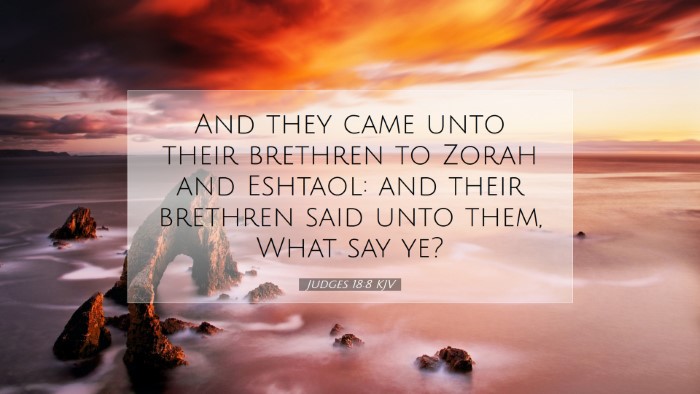Bible Commentary on Judges 18:8
Judges 18:8 states: "And when they came to Laish, they saw the people that were therein, how they dwelt careless after the manner of the Zidonians, quiet and secure; and there was no magistrate in the land, that might put them to shame in any thing; and they were far from the Zidonians, and had no business with any man."
Contextual Overview
This verse is situated within the narrative of the tribe of Dan as they seek a territory for themselves. The tribe sends out spies to scout the land and find a suitable location to settle, leading them ultimately to Laish, a city that is characterized by security, tranquility, and isolation from other powerful nations.
Theological Insights
- Carefree Living: Laish is described as having a people who dwelt "careless." This suggests a state of complacency and a lack of vigilance against external threats. Matthew Henry comments on the dangers of such a state, indicating that complacency often invites disaster.
- The Contrast with the Zidonians: The citizens of Laish lived in a manner similar to the Zidonians, indicating a disconnection from Israel's covenantal responsibilities. They were secure both physically and spiritually, not recognizing the need for God’s guidance. Albert Barnes notes that this tranquility can lead to unforeseen challenges when it comes to spiritual warfare.
- Isolation: The isolation of Laish from the Zidonians points to the theme of vulnerability in spiritual isolation. Adam Clarke elaborates on this, stressing that being far from the community of faith often leads to a further departure from godly principles.
Historical Context
The mention of Laish connects us to the historical backdrop of Israel's settlement in the Promised Land. The tribe of Dan had been given a specific territory, yet due to their inability to conquer it, they sought land among the Sidonians. The Israelites' failure to eradicate the Canaanite presence ensured that these neighboring peoples remained. This context is pivotal in understanding the ensuing consequences of their actions.
Commentary Insights
Matthew Henry: In his commentary, Henry draws attention to the implication of the people's security in Laish. He emphasizes that such a state may often lead to moral and spiritual decline, which can be understood as God's judgment. The attempts of Dan to settle among a complacent people points to the idea that one may seek security where God has not ordained it.
Albert Barnes: Barnes reflects on the identity of Laish and its inhabitants, connecting it to their spiritual negligence. The absence of a magistrate symbolizes a lack of governance by divine laws. Barnes warns that, without divine oversight through leaders, communities become susceptible to sin and chaos, which ultimately invites judgment from God.
Adam Clarke: Clarke’s analysis focuses on the implications of the isolation Laish had from the Zidonians. He observes that this separation often does not lead to independence from foreign influence but rather into a state of vulnerability. He highlights that the Danites' disregard for the covenant reflects a deeper malaise within Israel, suggesting a broader narrative of disobedience and spiritual decline throughout the land.
Practical Applications for Ministry
- Vigilance in Leadership: Pastors and church leaders must remain vigilant in maintaining spiritual oversight over their congregations. The lack of governance in Laish serves as a warning against complacency in leadership.
- The Danger of Complacency: This passage calls to reflection for individual believers on personal vigilance and the reliance on God amidst spiritual tranquility. It is crucial to recognize that peace can often mask underlying dangers.
- Community Engagement: The result of isolation and a lack of relational engagement with the covenant community demonstrates the importance of building and maintaining connections within the body of Christ, supporting one another against complacency.
Conclusion
Judges 18:8 serves as a pivotal reminder of the spiritual dangers hidden beneath a facade of tranquility and security. The commentary from respected theological voices like Matthew Henry, Albert Barnes, and Adam Clarke enhances our understanding of these dangers and encourages vigilance, godly leadership, and the importance of community. For pastors, students, theologians, and scholars, this passage invites deep reflection on personal and communal faith practices in light of scriptural teaching.


